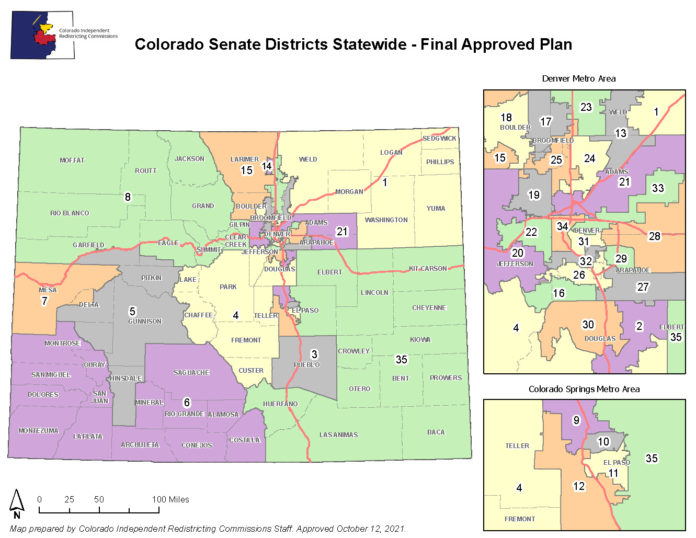

The Colorado Supreme Court approved plans for a new legislative map on Nov. 15. Like the congressional redistricting map approved earlier this month, the court found the new legislative map drawn by the Colorado Independent Redistricting Commission satisfied legal requirements despite objections from interest groups across the state.
In the unanimous opinion delivered by Justice Richard Gabriel, the court ruled that the new map complied with requirements in the Colorado Constitution. This is the first time in state history that a legislative map was drawn by Colorado citizens rather than legislators, and the new plans for House of Representatives and Senate districts will go into effect next year.
While less controversial than the congressional redistricting map, interest groups and individuals filed briefs in support and opposition of the new legislative map. Most controversial are plans to split the City of Lakewood and Jefferson County into two districts and plans to split parts of Pueblo and Greeley.
In the court opinion, Gabriel acknowledged the court’s limited role in the redistricting process, explaining that it assessed plans for legal compliance. “It is not our task to determine whether other plans could have been adopted. Nor is it our role to decide whether we might have adopted different plans were we acting in the first instance,” wrote Gabriel.
Article V, section 48.1 of the state constitution requires any newly drawn districts be of equal population, comply with the 1965 Voting Rights Act, preserve whole communities of interest and political subdivisions, create districts that are as compact as possible and maximize the number of politically competitive districts — in that order. The citizen commission redistricting process was created in 2018 when voters passed Amendment Z “to eliminate partisan politics from the redistricting process,” ensure transparency and allow Coloradans to participate in the process.
In addition to Amicus briefs filed with the court, opponents and supporters had the opportunity to present oral arguments to the court on Oct. 27.
Legal Challenges
The Colorado Latino Leadership, Advocacy & Research Organization and Fair Lines Colorado criticized the decision to split parts of the City of Lakewood in the western suburbs of Denver. In its Monday opinion, the state Supreme Court called the criticisms raised over Lakewood “the closest and most difficult” legislative redistricting legal challenge raised.
CLLARO and Fair Lines Colorado both argued that the commission didn’t provide sufficient evidence to explain why, and how, it split Lakewood. Both organizations raised the issue that the new plans will split Lakewood into two senate districts. And although Lakewood is currently split into two districts, CLLARO argued that Amendment Z presumed cities would fall into a single district unless preserving a community of interest. Fair Lines raised a similar argument in an amicus brief filed in opposition of the plans. It argued that “there is no legal justification for splitting a city that in and of itself would compose a State Senate district.”
The Colorado Supreme Court agreed with Fair Lines and CLLARO to an extent and expressed that the commission “could have made a better and more explicit record to support its decision.” But, the court ultimately held that the commission was not required to detail the underlying reasons for the lines drawn and found no legal reason to reject plans for Lakewood.
Fair Lines also opposed plans for Jefferson County that will split the front range county into a fifth senate district . The organization argued that it was unnecessary to create a fifth district that will place about 30,000 residents from Custer, Fremont, Lake, Chaffee, Park, Teller and Douglas counties into Senate District 4. It claimed that the plans do not preserve a community of interest and asked they be redrawn to include only four districts.
The Colorado Supreme Court was not persuaded. It found that the need to preserve relatively equal population sizes in the counties outweighed any concerns for preserving communities of interest and the commission’s decision was “amply supported by evidence.”
The court rejected arguments from Pueblo West resident Doris Morgan who argued that her home, a “census-designated place,” should be considered a political subdivision under redistricting requirements. The Supreme Court disagreed with Morgan’s interpretation and found the split of Pueblo into two districts was justified in order to satisfy population requirements and preserve communities of interest.
Another challenge addressed was the plan to split the City of Greeley into two senate districts. Former Greeley Mayor Thomas Norton argued the two-district split was made solely for the purpose of increasing Hispanic voter influence and therefore violating the Equal Protection Act. The Colorado Supreme Court rejected this argument and determined the split was made for “race neutral” reasons to preserve “various communities of interest [that] were more essential to the fair and effective representation of the district’s residents.”
The final argument addressed by the court was brought by Lynn Gerber, a Republican who ran for, and ultimately lost, last year’s Colorado State Senate race for Jefferson County. Gerber took issue with the political competitiveness of the legislative map. Pointing to earlier drafts that Gerber argued were more politically competitive, she argued the commission abused its authority and should have drawn plans that “ensure[ed] maximized political competitiveness using quantifiable evidence without sacrificing the interests of communities.”
The Colorado Supreme Court disagreed with Gerber and held that the commission fulfilled its requirement to maximize competitiveness “to the extent possible” while also considering a slate of other factors and requirements.
The court held that the commission met other requirements outlined in the Colorado Constitution and approved the plans. The commission will turn the final plans over to the Colorado Secretary of State by Dec. 29.

